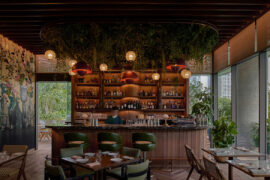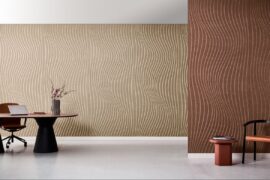Woods Bagot CEO, Nik Karalis talks about how he’s adjusted to the COVID-19 lockdown.

April 16th, 2020
According to Woods Bagot CEO Nik Karalis, what has changed in how his firm does business now are the obvious things-“virtual creation and collaboration, not that different for us internally, but for some of our clients it’s very different so we’re increasing our regular communication with them, keeping them up to date by the day.”
“As much as possible bringing them into the creation process, having them in our teams and whiteboard sessions as we normally would,” says Karalis.
“Business is less certain in terms of what projects will continue and what will go on hold. We are speaking more frequently to our clients to understand what is impacting their business and to see if there are ways to adjust our service offer to support them. For example, offering them our facilitated “campfire” design thinking sessions, to help them work through any business issues they are facing.”
“We’re witnessing more social interaction between staff; with the advent of social distancing, WB has taken on the role of social glue, making sure no one is lonely or unsupported. We’re also getting to meet each other’s families and pets – which is really nice,” he says.
Karalis also says that a lot of things are different, “different approaches to communication – it’s all video conferencing – more structured team management, more forward thinking.”
“Other differences are more challenging – creative collaborations and workshop sessions are a little harder and they take more time. There are demands on leadership for more communication and checking in and, while this is positive and rewarding, it’s time consuming, too.”

In terms of some positive results of this new working arrangement, Karalis says, “For a start, there’s the demystification of remote and flexible working. One of our senior associates who works flexible part time has noticed more empathy from colleagues to her working from home experience.”
“Our industry will see more designers working flexibly in the future and promotion opportunities opening up for those for whom it’s not possible to work traditional hours in a traditional office.”
“People are enjoying travelling less for work – whether that’s for the daily commute or between cities and countries, and that all comes with environmental benefits, too.
There’s a greater sense of cohesion, as we gain a window into people’s lives and are introduced to their families, pets, and home décor.”
“We’re seeing each other in new ways which is positive for the relationships which are so important to how we work together. It can be tough for parents, but they’re also enjoying being able to do things like have lunch with their partners and spend more time with their children and making the most of the benefits flexible working offers,” he says.
“The firm’s management of project workload is getting even better – defining the tasks to be undertaken, by whom and by when, needs to be crystal clear when working remotely.”
“The lockdown is driving improvements with direct immediate benefit and whose positive impact will continue when we return to our workplaces. They’re also being made more swiftly than in normal conditions,” says Karalis.
INDESIGN is on instagram
Follow @indesignlive
A searchable and comprehensive guide for specifying leading products and their suppliers
Keep up to date with the latest and greatest from our industry BFF's!

A longstanding partnership turns a historic city into a hub for emerging talent

Central Station by Woods Bagot in collaboration with John McAslan + Partners has been named one of two joint winners of The Building category at the INDE.Awards 2025. Recognised alongside BVN’s Sirius Redevelopment, the project redefines Sydney’s historic transport hub through a transformative design that connects heritage with the demands of a modern, growing city.

‘The Mandate Mirage: 2025 Workplace Futures Survey’ is a new report by international design practice Hassell, revealing that the real drawcard for attracting employees to the office in-person is choice.
The internet never sleeps! Here's the stuff you might have missed

Grounded by the rich warmth of American white oak, The Standard’s newly opened restaurant, Kaya, redefines the classic dining convention through a tasteful fusion of biophilic design, mid-century modern sensibility and elevated whimsy.

In contemporary interiors, ensuring a sense of comfort and wellbeing means designing and specifying finishes and products that support all the senses.

‘The Mandate Mirage: 2025 Workplace Futures Survey’ is a new report by international design practice Hassell, revealing that the real drawcard for attracting employees to the office in-person is choice.

At the NGV’s Making Good: Redesigning the Everyday, design becomes a force for repair. From algae-based vinyl to mycelium earplugs, the exhibition proves that rethinking the ordinary can reshape our collective future.